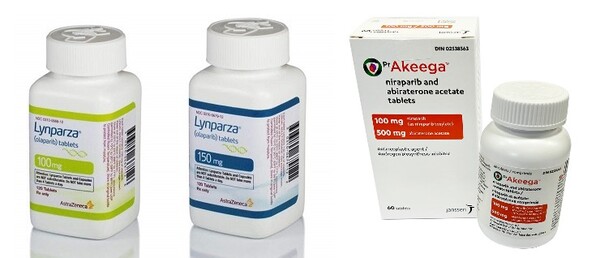PARP (poly ADP-ribose polymerase) inhibitors have recently emerged as a new treatment option for metastatic castration-resistant prostate cancer (mCRPC) with a poor prognosis and are expected to contribute significantly to improving survival rates.
However, they remain far beyond the reach of most Korean patients.
There are treatments available in Korea, such as AstraZeneca's Lynparza (olaparib) and Janssen's Akeega (niraparib/abiraterone), but there are many problems to be solved before they can get insurance benefits. Pharmaceutical companies and the government don’t care much, leaving anxious patients waiting indefinitely.
Currently, there are two PARP inhibitors available for prostate cancer treatment in Korea -- olaparib and niraparib.

AstraZeneca's olaparib monotherapy, Lynparza, and Janssen's niraparib and abiraterone combination, Akeega, are licensed for treating mCRPC and are being sold in the market.
Lynpaza is already actively distributed in Korea with multiple indications, including ovarian, breast, and pancreatic cancers, as well as prostate cancer. However, Akeega has not decided on its launching schedule since it won approval from the Ministry of Food and Drug Safety in September last year.
Industry sources speculate several reasons for the delayed launch of Akeega in Korea.
Akeega was approved for combination therapy with prednisolone in BRCA-mutated mCRPC patients who have not received chemotherapy, as one of the components of Akeega, abiraterone, which is used as a comparator for benefit review, is currently used in Korea with selective benefits (30/100) for this stage of treatment.
This is also the case with Lynparza, also approved as a combination therapy with abiraterone and prednisolone in chemotherapy-naïve mCRPC patients.
In other words, PARP inhibitors can't receive a reimbursement review unless the existing “abiraterone + prednisolone” combination therapy is converted to full reimbursement (5/100).
Fortunately, Hanmi Pharmaceutical recently launched a generic version of abiraterone in Korea, significantly reducing the price and making it easier for the government to consider fully reimbursing abiraterone for mCRPC.
However, even if the selective reimbursement issue for abiraterone is resolved, reimbursement for PARP inhibitors remains a "thorny issue.”
Drugmakers argue that PARP inhibitors already have multiple indications in different cancers and are used differently in each cancer type, making it difficult to recognize their full value through traditional pricing methods.
AstraZeneca, which developed Lynparza, applied for reimbursement for mCRPC in 2022 and passed the Cancer Disease Review Committee. However, the discussion of risk-sharing arrangements (RSAs) broke down at the subcommittee discussion stage of the Pharmaceutical Reimbursement Review Committee.
For the same reason, there has recently been an increasing demand to improve the reimbursement system due to the expanded use of immuno-oncology drugs and the increasing number of anticancer drugs, including PARP inhibitors, used in various cancer types.
Pharmaceutical companies call for introducing “indication-specific drug pricing,” but the government says it is “premature.”
In addition to the administrative costs of changing the health insurance billing system, including the creation of new codes, there is also a need for a social consensus on how patients will accept the different out-of-pocket costs for different types of cancer, according to government officials.
As the government and pharmaceutical companies continue quarreling while failing to narrow their gap, Korean prostate cancer patients have been marginalized from the benefits of PARP inhibitors for years, not knowing when the stalemate ends.

